Eating peanuts in winter is fun. By the way, seeing its benefits, it is called cheap almonds. it is a superfood. Also, know what is better than eggs and chicken.
health benefits of peanut
Peanut is a common superfood fruit found in homes and shops, but it is as common as it is because of its properties. In winter, it is not less than any medicine. It not only gives strength but also protects us from cold. Come learn the various uses and health benefits of peanut.
By the way, in our country, people eat peanuts with great fervor, whether it is a sweet dish or salted, because peanuts are a treasure of health. It is also a cheap source of vegetable protein.
Peanuts are a good source of iron, niacin, calcium, and zinc. Some peanuts have 426 calories, 5 grams of carbohydrates, 17 grams of protein and 35 grams of fat.
In this, the amount of protein is 1.3 times that of meat, 2.5 times from eggs and 4 times more than fruits. Do you know that 100 grams of raw peanuts have protein equivalent to 1 liter of milk?.
Peanuts contain more than 25 percent of the protein content. Peanut is also effective in increasing digestive power. The amount of minerals and vitamins found in 250 grams of roasted peanuts cannot be obtained from 250 grams of meat.
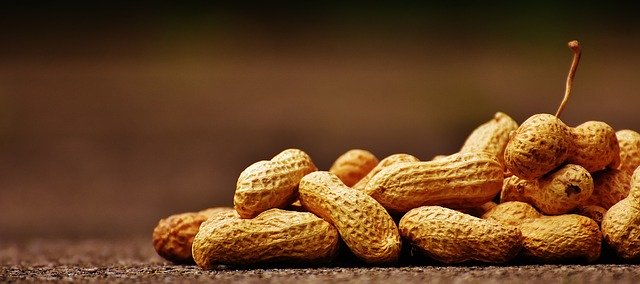
Peanuts contain more than 25 percent of the protein content. Peanut is also effective in increasing digestive power. The amount of minerals and vitamins found in 250 grams of roasted peanuts cannot be obtained from 250 grams of meat.

Peanuts Nutrition-
Peanuts have a strong nutritional profile. They are an excellent source of plant-based protein fiber, and many key vitamins and minerals. Peanuts come in many forms, including roasted, salted, chocolate-coated, and like peanut butter. Different types have different nutritional profiles and various health benefits.
Along with their healthful nutritional profile, peanuts are a calorie-rich superfood, so they are most healthful when enjoyed in moderation. In this article, we provide the nutritional profile of peanuts, their health benefits, and how different types compare.
Peanuts are an especially good source of healthful fats, protein, and fiber. They also contain plenty of potassium, phosphorus, magnesium, and B vitamins. Despite being high in calories, peanuts are nutrient-rich and low in carbohydrates.
According to the United States Department of Agriculture (USDA), 100 grams of raw peanutsTrusted Source contains 567 calories and the following nutrients in grams (g), milligrams (mg), or micrograms (mcg):
Here are the nutrition facts for 3.5 ounces (100 grams) of raw peanuts:
Along with their healthful nutritional profile, peanuts are a calorie-rich superfood, so they are most healthful when enjoyed in moderation. In this article, we provide the nutritional profile of peanuts, their health benefits, and how different types compare.
Peanuts are an especially good source of healthful fats, protein, and fiber. They also contain plenty of potassium, phosphorus, magnesium, and B vitamins. Despite being high in calories, peanuts are nutrient-rich and low in carbohydrates.
According to the United States Department of Agriculture (USDA), 100 grams of raw peanutsTrusted Source contains 567 calories and the following nutrients in grams (g), milligrams (mg), or micrograms (mcg):
Here are the nutrition facts for 3.5 ounces (100 grams) of raw peanuts:
- Calories: 567
- Water: 7%
- Protein: 25.8 grams
- Carbs: 16.1 grams
- Sugar: 4.7 grams
- Fiber: 8.5 grams
- Fat: 49.2 grams
- Saturated: 6.28 grams
- Monounsaturated: 24.43 grams
- Polyunsaturated: 15.56 grams
- Omega-3: 0 grams
- Omega-6: 15.56 grams
- Trans: 0 grams
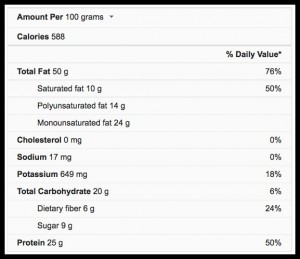
Peanut Vitamins and minerals
Peanuts are an excellent source of various vitamins and minerals, including:
- Biotin. Peanuts are one of the richest dietary sources of biotin, which is important during pregnancy.
- Copper. A dietary trace mineral, copper is often low in the Western diet. Deficiency may have adverse effects on heart health.
- Niacin. Also known as vitamin B3, niacin has various important functions in your body. It has been linked to a reduced risk of heart disease.
- Folate. Also known as vitamin B9 or folic acid, folate has many essential functions and is especially important during pregnancy.
- Manganese. A trace element, manganese is found in drinking water and most foods.
- Vitamin E. A powerful antioxidant, this vitamin is often found in high amounts in fatty foods.
- Thiamine. One of the B vitamins, thiamine is also known as vitamin B1. It helps your body's cells convert carbs into energy and is essential for the function of your heart, muscles, and nervous system.
- Phosphorus. Peanuts are a good source of phosphorus, a mineral that plays an essential role in the growth and maintenance of body tissues.
- Magnesium. An essential dietary mineral with various important functions, sufficient magnesium intake is believed to protect against heart disease.
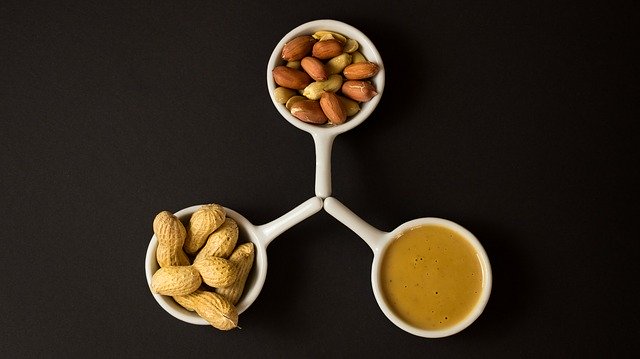
Peanut protein
Protein Content Specifics of peanut-
A one-ounce serving of raw peanuts provides 7.3 grams of protein. Dry roasted peanuts provide 6.7 grams of protein per ounce. Two tablespoons of peanut butter will give you about 8 grams of protein. Your body needs at least 0.8 grams of protein per kilogram of body weight, according to the U.S. Institute of Medicine.
A one-ounce serving of raw peanuts provides 7.3 grams of protein. Dry roasted peanuts provide 6.7 grams of protein per ounce. Two tablespoons of peanut butter will give you about 8 grams of protein. Your body needs at least 0.8 grams of protein per kilogram of body weight, according to the U.S. Institute of Medicine.
Proteins are long chains of components called amino acids. Your body digests protein in foods into constituent amino acids and reforms them into the proteins that it needs for structure as well as enzymes that carry out biochemical processes in your body
You can't always eat a meal, so reach for a healthy snack. Peanuts are rich in protein, an essential nutrient that helps your body build and maintain muscles, hair, skin, organs and other body tissue.
You can't always eat a meal, so reach for a healthy snack. Peanuts are rich in protein, an essential nutrient that helps your body build and maintain muscles, hair, skin, organs and other body tissue.
Instead of heading to the vending machine for your afternoon snack, bring a small bag of peanuts from home to give you energy and protein to help your body function optimally.
This equates to approximately 0.4 grams per pound. If you are physically active, you may require additional protein for energy and for muscle growth and repair.
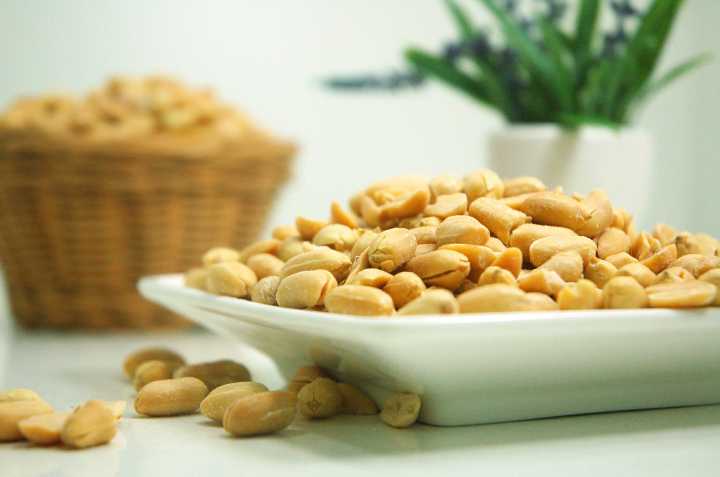
Are peanuts good for health-
Yes, It is also rich in Vitamin E, K, and B6. But few people will know that it is very beneficial for health as well. Most of them eat it for taste. But believe me, you will also be shocked to know the benefits of this,
- The element present in peanuts provides relief in many stomach related problems. Constant intake does not cause constipation. Also, the problem of gas and acidity is also relieved.
- Peanut is also useful in wet cough, regular intake strengthens the stomach and lungs, increases digestive power and also removes the problem of loss of appetite.
- Regular intake of peanuts is very beneficial for pregnant women, it helps in the development of the baby during pregnancy.
- According to one study, people who have a higher level of triglyceride in their blood, if they eat peanuts, their blood lipid level of triglyceride level is reduced by 10.2%.
- Peanuts are rich in omega 6, which keeps the skin soft and moist and many people use peanut paste as a face pack as well.
- Peanuts play an important role in controlling cholesterol, research has also shown that eating some peanuts 5 days a week reduces the risk of heart diseases.
- If 50 or 100 grams of peanut grains are eaten daily after eating, then health is made, food is digested, there is no lack of blood in the body.
- Proteins, beneficial fats, fiber, minerals, vitamins, and antioxidants are found in plenty in peanuts, due to its intake, the skin looks young throughout its life.
- Calcium and vitamin D are found in plenty in peanuts, eating it strengthens bones. Eating raw peanuts daily increases milk in weaning women.
- Eating peanuts also keeps the brain fit.
- Massaging peanut oil in winter and eating peanuts keeps the skin soft and dry cold air does not break hands and feet.

Peanut butter benefits
Peanut butter is a firm favorite superfood among adults and children alike. Although tasty, many people wonder about the health benefits of peanut butter.Peanuts and peanut butter contain nutrients that may boost a person's heart health and improve blood sugar levels.
Depending on how people use peanut butter in their diet, it can help them lose weight, or put on pounds during weight training or bodybuilding.
However, peanut butter is high in calories and fat, so people should enjoy it in moderation.
In this article, we look at the benefits of eating peanut butter and explain the risks associated with consuming it.

peanut butter nutrition benefit
Peanut butter provides a good amount of protein, along with essential vitamins and minerals, such as magnesium, potassium, and zinc.Most notably, each 2-tablespoon (tbsp) serving of smooth peanut butter provides the following nutrients, minerals, and vitamins:
- Protein- Peanut butter contains 7.02 grams (g) of protein per 2-tbsp serving. This counts toward the recommended dietary allowances (RDA) for women of 46 g and 56 g for men, which varies by age and activity level.
- Magnesium- With 57 milligrams (mg) of magnesium, each serving helps towards the RDA of 400–420 mg in men and 310–320 in women. Magnesium is essential for health, playing a role in over 300 chemical processes in the body.
- Phosphorous- Each serving contains 107 mg of phosphorus, which is about 15.3 percent of the RDA of 700 mg for adults. Phosphorus helps the body to build healthy cells and bones and helps cells to produce energy.
- Zinc- A serving of peanut butter provides 0.85 mg of zinc. This is 7.7 percent of the recommended daily intake of 11 mg for men, and 10.6 percent of the RDA of 8 mg for women. Zinc is necessary for immunity, protein synthesis, and DNA formation.
- Niacin- Peanut butter contains 4.21 mg of niacin per serving, which makes a useful contribution towards a person's recommended intake of 14 to 16 mg. Niacin benefits digestion and nerve function and helps produce energy.
- Vitamin B-6. With 0.17 g of vitamin B-6 per serving, peanut butter provides almost 14 percent of an adult's RDA of 1.3 mg. Vitamin B-6 plays a role in over 100 enzyme reactions in the body and may be necessary for heart and immune system health.
Each serving contains 3.05 g of saturated fats, which is 23.5 percent of the American Heart Association's maximum recommended daily intake of saturated fat for those consuming 2,000 calories a day. People should aim for less than 13 g of saturated fat per day.
It also contains 152 mg of sodium, which is 10.1 percent of an adult's ideal daily upper intake of sodium of 1,500 mg.
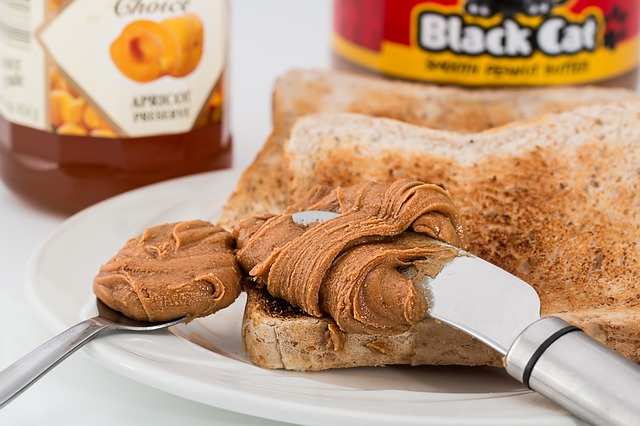
Nutritional profile of peanut butter
The table below provides a detailed nutritional profile of 2 tbsp of smooth peanut butter:- Calories 188
- Protein 7.02 g
- Saturated fats 3.05 g
- Monounsaturated fats 6.63 g
- Polyunsaturated fats 3.63 g
- Carbohydrates 7.67 g
- Fiber 1.80 g
- Sugars 2.08 g
- Calcium 17 mg
- Iron 0.69 mg
- Magnesium 57 mg
- Phosphorus 107 mg
- Potassium 189 mg
- Sodium 152 mg
- Zinc 0.85 mg
- Niacin 4.21 mg
- Vitamin B-6 0.18 mg
- Vitamin E 1.90 mg
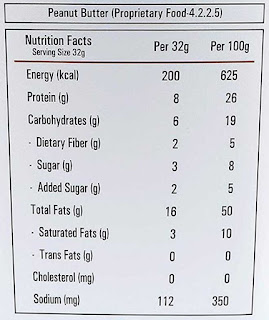
peanut butter health benefit
Peanut butter has many health benefits you can tap into. Here are a few to get you started! Know all the health benefits of your favorite spread.Good for Weight Loss– Eating peanuts and peanut butter helps control hunger without leading to weight gain.
Full of Healthy Fat– The fat in peanut butter is heart-healthy monounsaturated fat, the good fat your body needs.
High in Valuable Nutrition– Peanut butter has potassium as well as protein which lower the risk of high blood pressure, stroke, and heart disease.
High in Fibre– It also contains fiber for your bowel health, healthy fats, magnesium to fortify your bones and muscles, Vitamin E and antioxidants.
Energy Booster– Peanut butter contains good amounts of healthy fats and protein which means it contains plenty of calories that will give energy.
Better blood circulation– it is a great source of iron, magnesium, and potassium making it helpful for maintaining the proper blood flow in the body.
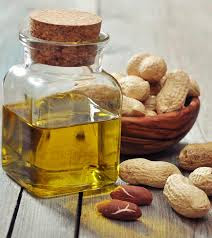
Peanut Oil benefit-
Just as peanuts are very useful and beneficial for your health. Similarly, the use of peanut oil is also helpful in getting rid of many diseases. Peanut oil is very beneficial compared to other oils.It contains plenty of nutrients, which are very beneficial from a health point of view. Peanut oil has the properties of lowering cholesterol levels, keeping heart health, and maintaining digestion. The benefits of peanut oil are as follows.
Get rid of stomach problem-
You can get rid of stomach problems by using peanut oil. For example, constipation, digestion, diarrhea, etc. get relief from diseases. So if you are troubled by a stomach problem, then use peanut oil in your diet.
Beneficial for hair
Peanut oil is also very beneficial for hair. It provides adequate nutrition to the hair. The use of these two hair problem ends. Along with this, it is also effective for removing dandruff. If you have dandruff in hair then apply peanut oil, do not wash for two to three hours.Treatment of pimples -
This oil is also helpful in curing skin problems. Applying 2 -3 drops of lemon juice mixed with peanut oil helps in treating the rash released on the body.
Aromatherapy
Peanut oil is also used in aromatherapy. Massage and warm bath using peanut oil can improve the skin.
Relieve dry skin and wrinkles
Peanut oil can also be used to treat dry skin. It helps in reducing wrinkles by providing moisture to the skin. It is a type of natural skincare. Applying this paste on dry skin provides great relief.Are peanuts good for diabetes-
All those who have diabetes complain. They should use peanut oil. Adequate amount of insulin remains in the body after consuming this oil. With this, the level of glucose in the blood remains controlled.

Keep your heart fit
Peanut oil keeps many heart-related diseases away. Actually, it makes the flow of blood in the arteries smoothly. Along with this, it has also proved to be helpful in the problem of high blood pressure.
Pain relief-
Massaging peanut oil provides relief in the case of joint pain. Massaging it with lukewarm heat is also beneficial. You can also add garlic and fenugreek to it if you want.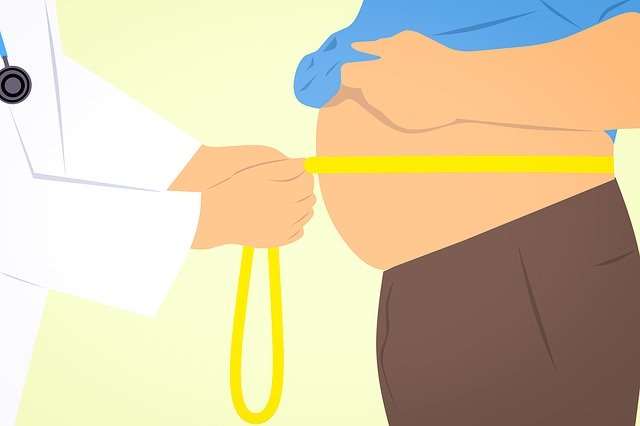
Are peanuts good for weight loss
yes, Peanut oil is beneficial in removing the problem of obesity. Let me tell you that peanut oil helps in controlling body fat. This is one that does not increase weight, but it reduces. In addition, it contains a balanced amount of fatty acids, which does not increase fat much.Various factors make peanuts weight-loss-friendly food:-
- They reduce food intake by promoting fullness to a greater extent than other common snacks, such as rice cakes.
- Because of how filling peanuts are, people, appear to compensate for increased peanut consumption by eating less of other foods.
- When whole peanuts are not chewed well enough, a portion of them may pass through your digestive system without being absorbed.
- The high content of protein and monounsaturated fat in peanuts may increase calorie burning. Peanuts are a source of insoluble dietary fiber, which is linked to a reduced risk of weight gain.
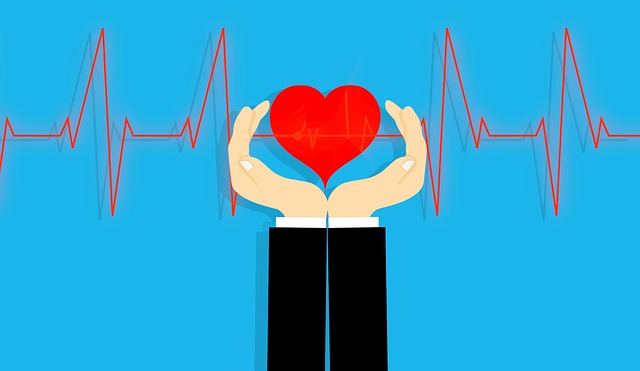
Make your heart healthy
Consumption of peanut oil does not cause coronary artery disease and blood flow is good in the pulse. Peanut oil is rich in monounsaturated fatty acids (MUFA), due to which the amount of fat in the body does not reach very high and bad cholesterol also does not reach the body.
Peanut oil is also considered very beneficial for high blood pressure problems. It contains unsaturated fat, which helps us avoid high blood pressure, as well as protects the heart.
BLOOD PRESSOR
Peanut oil is also considered very beneficial for high blood pressure problems. It contains unsaturated fat, which helps us avoid high blood pressure, as well as protects the heart.Remedy for chapped lips
- Before bathing, take a quarter teaspoon of peanut oil in the palm, rub it in the palm with the finger and then massage this oil on the lips. This will not only soften the lips but also increase their natural shine.
- Peanut oil also provides benefits in hands, feet and joint pain. Massaging the body with peanut oil strengthens the meat muscles and also relieves pain.
- Skin diseases like ringworm, itching, itching are also cured by lukewarm massage of peanut oil.
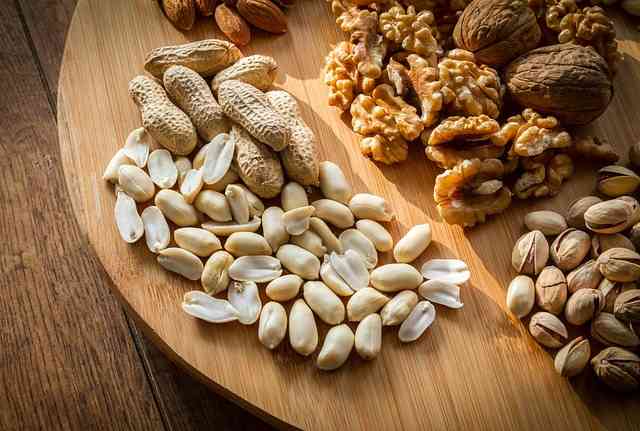
how to eat peanuts
In peanuts, the chemical arginine, an amino acid, is found in abundance. It is very beneficial in curing the disease, because of this, a quick improvement in symptoms like rapid cough was observed. Tb Eating peanuts every day has special benefits.
People who have complaints of bile, high BP, or excess heat should not consume more peanuts.
peanut digestion time
All foods digest in the body at different times. This is how long they sit in the stomach before passing into the intestine. It’s important to understand the different food digestion times to avoid digestive issues or discomfort.Nuts all take around 3 hours to digest. This includes the legume peanuts and all other nuts like almonds, cashews, walnuts, pecans, and brazils.
Peanuts are a high-energy food containing an abundance of healthful fats, protein, and fiber, as well as a wide array of vitamins and minerals. Your body digests peanuts with the same physical and enzymatic processes employed for other foods that contain a mixture of nutrients.
Unless you have a peanut allergy or a preexisting medical condition that interferes with your digestive processes, your body should be able to digest peanuts without difficulty.
Although peanuts are normally digested by the human digestive tract, allergies and certain gastrointestinal problems may interfere with the normal breakdown and absorption of various superfoods.
If you experience nausea, vomiting, abdominal pain, excess intestinal gas, diarrhea, constipation, hives or other unexplained symptoms after eating peanuts.
Although peanuts are normally digested by the human digestive tract, allergies and certain gastrointestinal problems may interfere with the normal breakdown and absorption of various superfoods.
If you experience nausea, vomiting, abdominal pain, excess intestinal gas, diarrhea, constipation, hives or other unexplained symptoms after eating peanuts.
Benefits of soaked peanuts-
- This does not increase the bile, as the peanut effect is hot, so the heat soaked in water reduces some people are allergic to eating more hot things, so those people especially peanuts should be soaked for six to seven hours.
- If you want, you can eat these soaked donuts mixed with curd and coconut and also make peanut sauce.
- Eating peanuts also benefit the diabetic patient, it also maintains energy in diabetes.
- Shortly before eating, a little roasted peanut is taken with tea or coffee without sugar, then the appetite becomes calm and the person eats less food. And in this way, the bodyweight starts decreasing gradually.
- If you have dryness and dryness in your skin, then massage with a little peanut oil, milk and rose water.
- Take a shower after 20 minutes. The dryness of the skin will be cured by this.

peanut disadvantages-
Eating too many peanuts could interfere with the absorption of minerals and if you buy salted peanuts, you’ll consume a lot of sodium. This might undo the health benefits that you’ll get if you consume the required number of peanuts.
These are the side effects of eating too many peanuts:
Allergies- Peanuts are also very dangerous for sensitive skin. Itching in the mouth, swelling of face and throat, etc. are the result of its allergy.
These are the side effects of eating too many peanuts:
Allergies- Peanuts are also very dangerous for sensitive skin. Itching in the mouth, swelling of face and throat, etc. are the result of its allergy.
Asthma- and sometimes even trouble breathing, asthma attacks can also occur. Therefore, as soon as an allergy is felt, contact the doctor immediately and do not consume any dry fruit until it is cured.
Cough- Never drink water immediately after eating peanuts. Doing so may cause coughing problems. Keep in mind that an excessive amount of peanuts can harm your body.
Heart- Salt or fried peanuts should not be eaten by heart and BP patients. Eating too many peanuts increases the amount of bile in the body
Thyroid- Thyroid patients should not consume peanuts. An element called Goitrogens can unbalance the process of the thyroid gland.
Obesity- Peanut is a high-calorie seed, its excessive intake can also lead to obesity, so eat it in a balanced quantity. Kidney or cheek bladder patients should also not consume peanuts.
I hope you will surely like the peanut health benefits. Do share it among your family and friends, if you want to give any kind of deficiency or any suggestion in it, do comment, And for similar posts, please subscribe to our blog www.recifit.com with Email. and follow me on Instagram.
Some of the links in this post may be affiliate links – which means if you buy the product I get a small commission (at no extra cost to you). If you do buy it, then thank you! That’s what helps us to keep Recifit-food and fitness running.



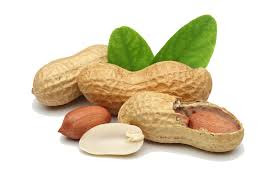




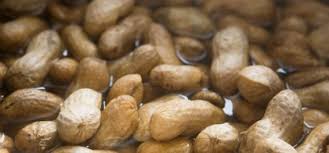









0 Comments